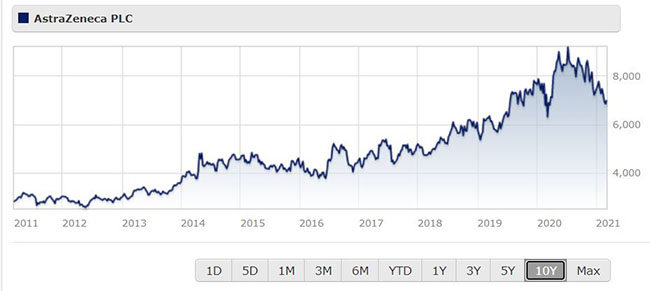
Our stock of the week featured four FTSE 100 companies that are ranked highly for gender diversity, and vaccine pioneer AstraZeneca (AZN) has come out on top, as voted for by our Twitter followers.
AstraZeneca was one of the first global pharmaceutical companies to bring out a workable coronavirus vaccine, a development that changed the narrative on how the world plans to exit from the pandemic. The Oxford-AstraZeneca vaccine, as it’s known, has already been given to more than 11 million British people and is central to the UK Government’s plans to leave lockdown. This cause for optimism has been clouded in recent weeks by concerns over side effects and the politicisation of the vaccine rollout. Some European countries temporarily suspended the rollout of the Astra jab, with Germany only just approving the vaccine for use in the over-65s, while Italy blocked a shipment of vaccines to Australia.
For a company’s shareholders, to be in the vanguard of such a world-changing programme should in theory be exciting and it was for a few months last year. But Astra’s share price has underwhelmed in the short term, losing around 1% in 2020 and around 2% so far this year. The political row has not helped, and Astra has pledged not to make a profit from the vaccine while the pandemic lasts. This leaves the shares moderately undervalued at just below £70, according to Morningstar analyst Damien Conover, who assigns the wide-moat company a fair value of £83.60 per share.

Away from coronavirus, Astra’s strong lineup of new drugs, particularly those targeted at cancer treatment, are not fully appreciated yet by investors, says Conover. "AstraZeneca's pipeline is emerging as one of the strongest in the drug group, and we think the company is developing several key products that hold blockbuster potential," he says. The acquisition of rare disease firm Alexion in 2020 will help broaden Astra’s drug portfolio, Conover adds.
Over 10 years, AstraZeneca investors have been well rewarded: in 2011 the shares were around £28 and spiked above £90 last summer as vaccine hopes reach their peak, a gain of more than 200%. At one point last year, Astra was Britain’s largest listed company. This long-term gain has made AstraZeneca the second largest company in the FTSE 100 after Unilever (ULVR), and has helped it to overtake its rival GlaxoSmithKline (GSK). Shares in Glaxo, which is also producing a coronavirus vaccine, are roughly at the same level they were 10 years ago.
Both companies are highly prized for their dividends and didn’t cut their payouts last year during the dividend crisis. With a yield of more than 6%, Glaxo was ahead of Astra and until recently was top of our list of highest yielding FTSE stocks, but it has just announced potentially big cuts to its standard 80p per share payout starting in 2020. Astra is yielding less than 3% now but payouts have been stable for the last five years. While dividend cover is below 1, there have been so signs of any plans to cut the payout.
Given Astra’s size, investors in UK trackers will already have a large exposure to the company – it’s the second largest holding in the Morningstar UK Index, for example. Active income funds holding Astra include Neutral-rated ASI Income Focus, which was formerly run by Neil Woodford, and Gold-rated Trojan Ethical Income fund. Given Astra's leadership in governance (particularly gender equality), the company is well represented in a number of ESG/sustainable funds, such as Silver-rated Royal London Sustainable Leaders, where it's the top holding.



























